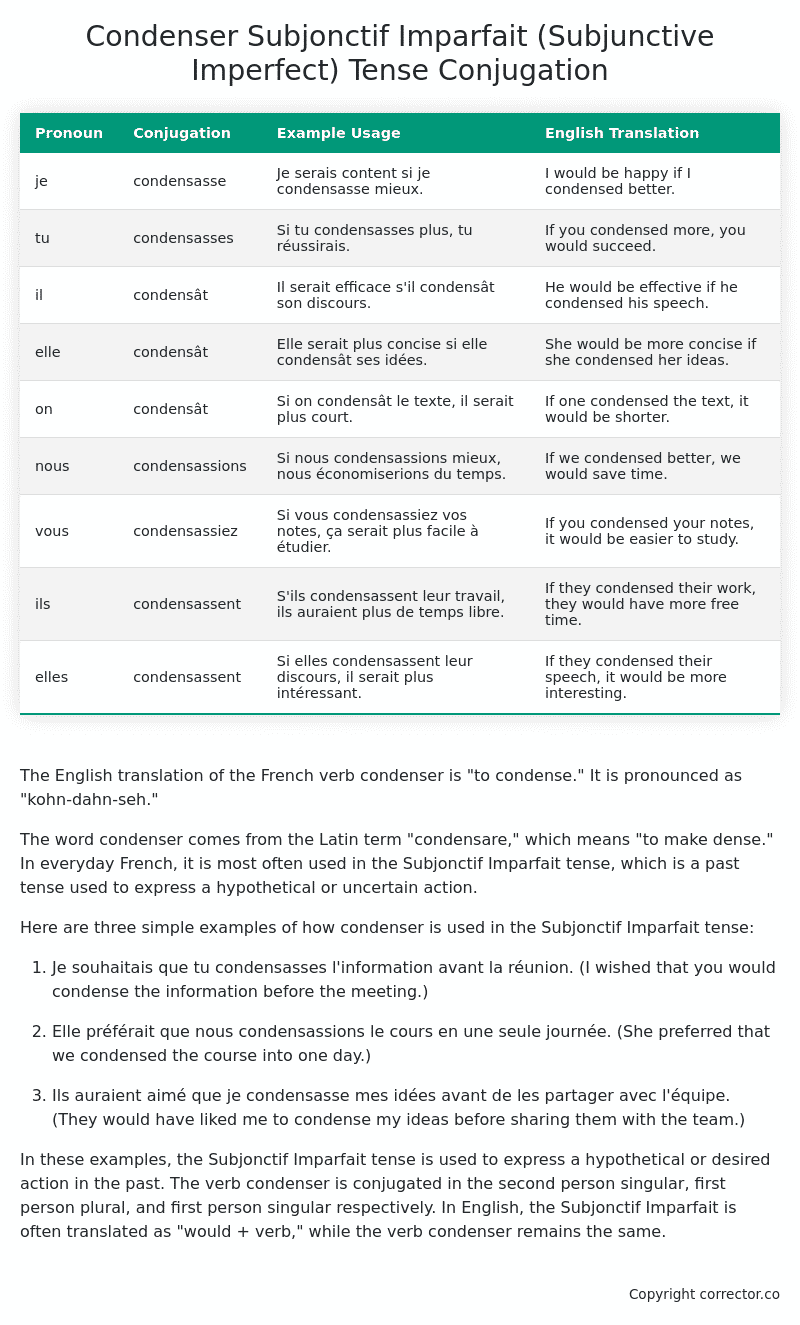Subjonctif Imparfait (Subjunctive Imperfect) Tense Conjugation of the French Verb condenser
Introduction to the verb condenser
The English translation of the French verb condenser is “to condense.” It is pronounced as “kohn-dahn-seh.”
The word condenser comes from the Latin term “condensare,” which means “to make dense.” In everyday French, it is most often used in the Subjonctif Imparfait tense, which is a past tense used to express a hypothetical or uncertain action.
Here are three simple examples of how condenser is used in the Subjonctif Imparfait tense:
-
Je souhaitais que tu condensasses l’information avant la réunion.
(I wished that you would condense the information before the meeting.) -
Elle préférait que nous condensassions le cours en une seule journée.
(She preferred that we condensed the course into one day.) -
Ils auraient aimé que je condensasse mes idées avant de les partager avec l’équipe.
(They would have liked me to condense my ideas before sharing them with the team.)
In these examples, the Subjonctif Imparfait tense is used to express a hypothetical or desired action in the past. The verb condenser is conjugated in the second person singular, first person plural, and first person singular respectively. In English, the Subjonctif Imparfait is often translated as “would + verb,” while the verb condenser remains the same.
Table of the Subjonctif Imparfait (Subjunctive Imperfect) Tense Conjugation of condenser
| Pronoun | Conjugation | Example Usage | English Translation |
|---|---|---|---|
| je | condensasse | Je serais content si je condensasse mieux. | I would be happy if I condensed better. |
| tu | condensasses | Si tu condensasses plus, tu réussirais. | If you condensed more, you would succeed. |
| il | condensât | Il serait efficace s’il condensât son discours. | He would be effective if he condensed his speech. |
| elle | condensât | Elle serait plus concise si elle condensât ses idées. | She would be more concise if she condensed her ideas. |
| on | condensât | Si on condensât le texte, il serait plus court. | If one condensed the text, it would be shorter. |
| nous | condensassions | Si nous condensassions mieux, nous économiserions du temps. | If we condensed better, we would save time. |
| vous | condensassiez | Si vous condensassiez vos notes, ça serait plus facile à étudier. | If you condensed your notes, it would be easier to study. |
| ils | condensassent | S’ils condensassent leur travail, ils auraient plus de temps libre. | If they condensed their work, they would have more free time. |
| elles | condensassent | Si elles condensassent leur discours, il serait plus intéressant. | If they condensed their speech, it would be more interesting. |
Other Conjugations for Condenser.
Le Present (Present Tense) Conjugation of the French Verb condenser
Imparfait (Imperfect) Tense Conjugation of the French Verb condenser
Passé Simple (Simple Past) Tense Conjugation of the French Verb condenser
Passé Composé (Present Perfect) Tense Conjugation of the French Verb condenser
Futur Simple (Simple Future) Tense Conjugation of the French Verb condenser
Futur Proche (Near Future) Tense Conjugation of the French Verb condenser
Plus-que-parfait (Pluperfect) Tense Conjugation of the French Verb condenser
Passé Antérieur (Past Anterior) Tense Conjugation of the French Verb condenser
Futur Antérieur (Future Anterior) Tense Conjugation of the French Verb condenser
Subjonctif Présent (Subjunctive Present) Tense Conjugation of the French Verb condenser
Subjonctif Passé (Subjunctive Past) Tense Conjugation of the French Verb condenser
Subjonctif Imparfait (Subjunctive Imperfect) Tense Conjugation of the French Verb condenser (this article)
Subjonctif Plus-que-parfait (Subjunctive Pluperfect) Tense Conjugation of the French Verb condenser
Conditionnel Présent (Conditional Present) Tense Conjugation of the French Verb condenser
Conditionnel Passé (Conditional Past) Tense Conjugation of the French Verb condenser
L’impératif Présent (Imperative Present) Tense Conjugation of the French Verb condenser
L’infinitif Présent (Infinitive Present) Tense Conjugation of the French Verb condenser
Struggling with French verbs or the language in general? Why not use our free French Grammar Checker – no registration required!
Get a FREE Download Study Sheet of this Conjugation 🔥
Simply right click the image below, click “save image” and get your free reference for the condenser Subjonctif Imparfait tense conjugation!

Condenser – About the French Subjonctif Imparfait (Subjunctive Imperfect) Tense
Formation
Common Everyday Usage Patterns
Interactions with Other Tenses
Subjonctif Présent
Indicatif Passé Composé
Conditional
Conditional Perfect
Summary
I hope you enjoyed this article on the verb condenser. Still in a learning mood? Check out another TOTALLY random French verb conjugation!


